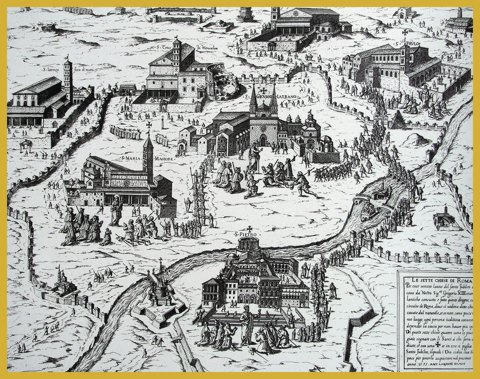The Pilgrimage
Contents
The Value of Pilgrimage
The Meaning of Pilgrimage
Jubilee Pilgrimages
Pilgrimage represents an ancient practice, a journey undertaken for reasons ranging from religious devotion to spiritual search. In both historical and modern contexts, these pilgrimages are characterized by a deep cultural and spiritual imprint, significantly influencing the lives of those who engage in them. The practice of pilgrimage is deeply rooted in many of the world's major religions, and in the context of Catholic Christianity, it assumes particular relevance during the Jubilee period.


Antoine Lafréry, Le sette chiese di Roma. Anno Santo 1575
The Value of Pilgrimage
In its broadest sense, pilgrimage is an act of physical movement, an "ire per agros", iterally "going through fields," as the etymology of the word reminds us. However, beyond the mere geographical journey, it represents an inner journey, a metaphor for the soul's path toward a deeper understanding of one’s existence and spirituality.
The value of the pilgrimage extends beyond mere religious practice; it embodies a transformative journey that aims at spiritual purification and personal renewal. Traditionally, pilgrims undertake these journeys to visit sacred places and participate in rituals believed to bring spiritual benefits such as penance, meditation, and prayer. These journeys offer the opportunity to detach from daily concerns and reflect on deeper life issues, one's spiritual path, and the relationship with the divine.
The Meaning of Pilgrimage
The meaning of the pilgrimage lies in its ability to represent an inner journey as much as an external one. As pilgrims traverse physical roads towards places of religious significance, they simultaneously engage in an inner journey of personal exploration and spiritual growth. During the Jubilee, the pilgrimage is particularly significant, as it offers the faithful the opportunity to reflect on their lives, perform acts of penance, and seek indulgence—the remission before God of the temporal punishments for sins, whose guilt has already been forgiven.
Christian pilgrimage, interpreted through the lens of the Bible, emerges as a recurring theme that connects the ancient people of Israel with today's believers. The figure of Abraham, who leaves his land to respond to God’s call, is emblematic of this journey of faith. Similarly, the journey of the Jewish people, led by Moses out of Egypt towards the Promised Land, symbolizes a path of liberation and hope, yet also one of trial and faith.
In the New Testament, the very life of Jesus Christ is presented as a pilgrimage, culminating in his journey to Jerusalem, where His passion, death, and resurrection offer salvation to humanity. The pilgrimages of Christians to holy places, therefore, are not merely tourist excursions but acts of devotion that echo the earthly journey of Christ, inviting believers to follow in his footsteps and to live the mystery of the cross and the resurrection.
Jubilee Pilgrimages
During the Jubilee, the passage through the Holy Door, exclusively opened for this occasion, stands as one of the most significant aspects of the pilgrimage. This act, steeped in symbolism, signifies an entry towards redemption and spiritual purification. The most noteworthy pilgrimages include visits to Rome's four major papal basilicas: St. Peter's, St. John Lateran, Santa Maria Maggiore, and St. Paul Outside the Walls. Every pilgrim crossing the Holy Door of these basilicas during the Jubilee engages in a devotional act, reaffirming their faith and commitment to a journey of spiritual growth and reconciliation.
Jubilee Routes in Rome:
The Papal Basilicas Route: Invites meditation on the apostolic succession and the universality of the Church, incorporating visits to Rome’s four major basilicas.
The Pilgrimage of the Seven Churches: Established by St. Philip Neri, this traditional itinerary encourages visits to Rome's seven major basilicas.
The Women Patrons of Europe and Doctors of the Church Route: Focuses on bringing to the forefront the figures of holy European women recognized as Patron Saints of Europe and Doctors of the Church.
Iter Europaeum – The EU Churches Route: Established to commemorate the 50th anniversary of relations between the EU and the Holy See, this path highlights the churches of the European Union.
The pilgrimage during the Jubilee is not merely an occasion for visiting sacred sites and participating in religious ceremonies; it also offers a unique chance for the faithful to undergo profound personal and spiritual transformations. Through these practices, pilgrims aim to draw nearer to a state of grace, endeavoring to live in accordance with the teachings and values of their faith.
Drop us a line
Follow us
Discover the Jubilee
Experience the Jubilee
Jubilee locations
Get ready for the Jubilee
Rome and the Jubilee
